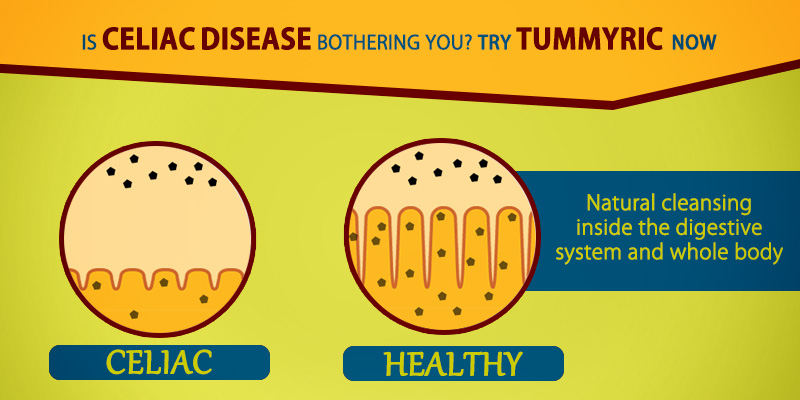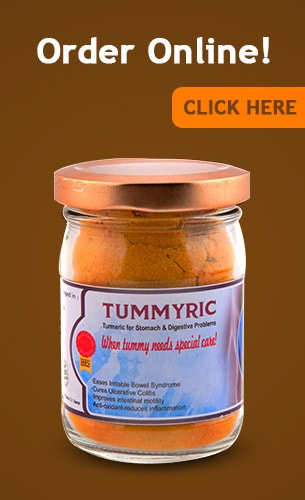Is celiac disease bothering you? try curcumin now

Are you one amongst those who always read the ingredients list on every pack or box of food items? Are you waiting for those days when you can just eat whatever you want? Is gluten hurting your Tummy?
People think taking one bite of food will not do any harm. But doubtlessly it does. They think the disease is just in one’s mind. This is the state person suffering from celiac disease goes through.
What Is Celiac Disease ? Celiac disease is a chronic digestive disorder resulting from an immune reaction to gliadin, a gluten protein found in wheat, barley, rye, and sometimes oats that causes people to become intolerant to gluten.
It involves inflammation and destruction of the inner lining of the small intestine and can lead to the mal absorption of minerals and nutrients.
Celiac disease affects about 1 in 141 Americans.
Causes Of Celiac Disease
Celiac disease is an immune disorder.
People who are more likely to have celiac disease include those with:
- Another autoimmune disease, such as type 1 diabetes, rheumatoid arthritis, or an autoimmune disease that affects the thyroid or the liver.
- A genetic disorder, such as Down syndrome or Turner syndrome.
- A family member who has the disease.
Symptoms Of Celiac Disease
Some common symptoms of celiac disease include:
- Gastrointestinal symptoms, such as abdominal cramps, diarrhea, gas, nausea and vomiting, and bloating
- Foul-smelling stools with excess fat in them
- Bone and joint pain
- Depression, irritability, and panic attacks
- Weakness and fatigue
- Easy bruising and nose bleeds
- Fluid retention
- Infertility
- Persistent hunger
- Iron deficiency anemia
- Malnutrition and nutrition deficiencies, including a lack of vitamin B12, D, and K
- Mouth sores and tooth discoloration
- Muscle wasting, muscle weakness, and muscle cramps
- Nerve damage, leading to tingling in the legs and feet
- Blood in the stools or in the urine
Diagnosis Of Celiac Disease
Blood tests may detect:
- Antigliadin antibodies
- Endomysial antibodies
- Anti-tissue transglutaminase antibodies
Treatment Of Celiac Disease
In conventional medicinal sciences, there is currently no treatment, except for avoiding gluten. With strict observance of the diet, the intestines will normally heal and symptoms disappear, but eating gluten again can cause a relapse.
It may be possible that you are not able to abstain from gluten or able to eradicate it completely from your diet .Then what is the alternative available with us?
Bagdara Farms have come up with a implausible solution for this. Their product named Tummyric can do wonders in treating celiac disease. Tummyric, a product created mainly to cater the problems related to stomach can really go in a long way to treat this disease.
Tummyric being rich in the finest traces of curcumin is a good anti inflammatory agent, which is the prime requirement for this disease due to the lining of the intestines getting destructed .
Several other properties of Tummyric that are worth discussing are:-
- Its anti inflammatory – It’s probably one of the best properties of curcumin. Due to its anti inflammatory property, it is very quick in healing the destruction of intestinal linings. It also helps in healing the swelling of intestines.
- It helps in detoxification process too – It promotes natural cleansing inside the digestive system and whole body, with no side effects.
- It strengthens the digestive system.
- It speeds up the healing process in the digestive system.
- It maintains healthy balance of stomach bacteria.
- It works great for gastrointestinal disorders.
- It supports body’s natural cleaning process.
- It boosts up your immunity to fight against the bacteria in the intestines and it thus regulates and shields the immune system.
- Curcumin consumption can be helpful in treatment of autoimmune disorders like celiac disease as curcumin has the ability to down regulate the expression of pro inflammatory cytokines and modulate other cells of the immune system like macrophages, B cells and T cells.
Give a try to Tummyric , sure it will do only good to your tummy.
Click here for more details : https://www.ncbi.nlm.nih.gov/pubmed/28850308


